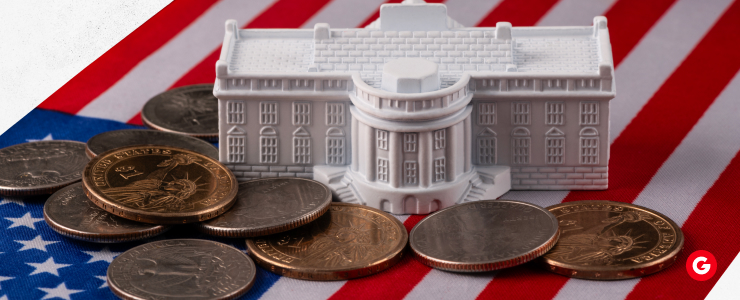While politics may be the primary concern during an election year in the US, the financial world is just as affected. A recurrent question that comes to everyone’s mind is: Do elections impact currency volatility? The answer is rather straightforward: Yes.
In these special and, at times, tense periods of the year, the U.S. dollar is known to experience extensive oscillations. Traders predict policy modifications and prepare for election outcomes that generally signal policy changes, tax cut negotiations, trade relationships, and new international relations strategies—all of which have the potential to either establish or shatter esteem towards the dollar.
This article will show why election years make the forex market so active. So, let’s get started!
Why Elections Stir Currency Markets
Elections signify moments of big transformative potential. The potential of a new figure on the throne promises modifications of policy concerning taxation, international trade, or interest rates. All of these profoundly impact the value of the U.S. dollar, which is the world’s most traded currency, making a big shift.
Investors want things to be as predictable as possible. The constituent policies present critical value considerations when their money is on the line. During elections, uncertainty around who the winner will be and what rules will change makes everything chaotic. This is why investors’ financial expectations often lead to a rush, causing the value of the dollar to fluctuate.

Factors Amplifying Currency Volatility During Elections
Several reasons explain why the U.S. dollar acts this way during voting years.
1. Policy Expectations Foster Controversy
A candidate’s campaign revolves around specific themes like taxes, employment opportunities, and international relations. After these policies have been proposed, there is some level of expectation or anxiety in the financial market. Traders act based on which plan they think is likely to dominate the election. This results in the U.S. dollar experiencing abnormal increases or decreases in its value.
2. Interest Rate Speculation
Presidents do not control the interest rates of the United States—the Federal Reserve does. Although, the Fed could be forced to respond to a new policy. In case of a risk, the Fed may opt to increase or decrease rates to safeguard the economy. Rate adjustments have an impact on the strength of the dollar, hence the results of an election are important.
3. Global Reactions to U.S. Elections
US elections do not only influence American citizens. Investors and traders around the world participate in the buying and selling of dollars. Any new policies involving international trade or taxes can alter the circulation of money around the globe. When certain foreign traders decide to liquidate their assets, the value of the dollar shifts.
4. Media and Public Sentiment
Every news outlet provides an analysis of public opinion polls and debates. Traders have to pay attention to any information they receive. Market reaction is often quick, with public perception temporarily moving the dollar value within hours. While offering precise value estimates, FXGiants also provides real-time market changes. Their online trading platform enables traders to make effective last-minute decisions.

How Does This Impact Businesses and Global Trade
Currency fluctuations in election years do not only affect traders but pose real problems for businesses that deal with buying, selling, or trading goods and services internationally. Here is how these factors come into play:
• U.S. Dollar Weakens: Due to the dollar losing strength, the importation of raw materials and goods has become more expensive. Companies have to either lower their profits or increase their selling price to make up for the cost.
• U.S. Dollar Strengthens: This is beneficial for importers. However, exporters experience challenges. It makes U.S. products way too expensive for consumers abroad, thereby reducing sales overseas.
• Contracts with Uncertain Terms: Businesses are known to sign long global contracts around the time of the election. If the dollar shifts direction after the agreement, profits can diminish or cease instantaneously.
• Higher Operating Costs: Day-to-day expenditures of companies, especially those who source parts from abroad are impacted because of currency fluctuations. Even tiny fluctuations in the rates can have huge impacts on the annual budget and financial plans.
• Hedging with Forex Tools: CFD trading is employed by many businesses to guarantee election prices months in advance. This eliminates the risk of slashing losses due to erratic price fluctuations.
What Strategies Investors Can Adopt During Election Volatility
During election years, there tend to be periods of heightened market volatility, which require revision of the investor strategy. In that regard, here are five effective approaches to consider:
Lower Risk by Diversifying Your Portfolio
In times of market uncertainty, spreading your investments across various asset classes such as equities, fixed-income securities, commodities, and cash helps lower risk exposure.
Limit Hedging to Contain Currency Risk
Investors face significant concern on currency volatility during elections. Tools such as options and forward contracts allow hedging and help secure unchangeable exchange rates.
Do Not Follow Downstreams, Stick To Long Term Plans
After elections, the markets do tend to bounce back, meaning to not panic sell and stick to your goals.
Focus On Economic Indicators Over Elections Polls
Data like job reports, inflation numbers, and interest rate updates often guide the market more than election speeches.
Maintain Cash To Spend On Trending Investments
Volatile periods can create good deals, so holding extra cash gives investors a chance to buy strong assets at lower prices.
Conclusion
The outcome of the U.S. elections significantly influences the change in global economies. The dollar rises or falls for reasons that are likely priced into the currency long before Election Day.
Both traders and businesses alike experience the repercussions of these events. The currency volatility during elections can pose a threat or it can open up new opportunities.
Understanding how elections affect the forex market is critical if you want to avoid losses and capture value. Platforms like FXGiants assist in simplifying these events. Their tools on MetaTrader 4 enable traders and business owners to react as well as stay updated on trends. Cutting-edge technology assists both novice and expert traders through all stages of the election cycle.
FAQs:
1. Why do US elections have an impact on the currency market?
Elections generate a great amount of uncertainty with regard to the policies a government will implement. Most traders begin to speculate about tax changes, trade policies, and economic programs which results in the dollar fluctuating.
2. What is the highest peak of volatility in elections?
As observed, volatility is at its peak a few months leading up to and following election day. The movement of prices becomes more extreme as traders set their positions based on the polls, debates, and preliminary results.
3. What tools do businesses use to protect themselves from volatile currency shifts during elections?
A lot of businesses hedge using strategies like forward contracts and CFD trading. These tools aid in locking in exchange rates and help in minimizing potential losses.
DISCLAIMER: This information is not considered investment advice or an investment recommendation, but is instead a marketing communication
